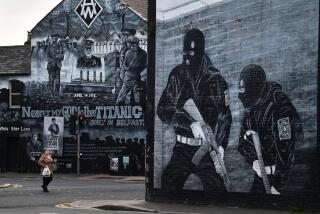2 Bombs Explode at British Army Base in N. Ireland
LONDON — Two terrorist car bombs exploded Monday at the largest British military base in Northern Ireland in an attack that may sound the death knell for struggling peace talks between Protestants and Roman Catholics in the divided province.
The British army reported that 20 soldiers and 11 civilian workers were injured in the blasts, a handful of them seriously.
The bombs exploded a few minutes apart near nightfall. The first detonated in the rain in a parking lot on the sprawling base that is the headquarters of the British army in Northern Ireland, the second near a base medical center where the injured were being tended.
The army said the second blast was apparently intended to maim those tending the injured after the first explosion. A number of medical workers were hurt.
There was no indication how the cars got near the heavily guarded Thiepval barracks, which includes the homes of senior officers and troops in the army’s 18,000-member Northern Ireland force.
British analysts called the attack in Lisburn, about eight miles southwest of Belfast, the capital, the most serious blow to peace hopes since republican bombers broke a cease-fire in February to launch a wave of attacks in England.
A minister living near the blast site said he saw the remains of a vehicle and shrapnel raining on a nearby playing field. One report said each car may have contained about 500 pounds of explosives. There was no warning. A doctor at nearby Lagan Valley Hospital said victims were being admitted with serious burns, fractures and head wounds.
“Barbaric . . . unspeakable,” said Prime Minister John Major, attending the start of his Conservative Party’s annual conference. There was immediate speculation that the bombs were timed to coincide with the party meeting.
The White House called it “an outrageous act of violence.”
The attack was the first against security forces since a Sept. 1, 1994, cease-fire by the Irish Republican Army that was later joined by Protestant extremist groups.
There was no immediate claim of responsibility for the attack. But suspicion fell on republican zealots who seek union of the province with the Irish Republic, particularly a tiny group called the Irish Continuity Army. A breakaway from the IRA, the army was implicated in the bombing of a hotel July 14 in the mostly Protestant town of Enniskillen. The group acknowledged last week that it was responsible for recently placing a 250-pound bomb in a car in Belfast. Police destroyed that device in a controlled explosion.
Monday’s attack put serious new pressure on the sole surviving element of the cease-fire: a truce in Northern Ireland between republican Catholic extremists and their loyalist Protestant enemies who seek continued union with Britain.
Members of one loyalist party with links to a paramilitary group met Monday with jailed members in Belfast’s Maze Prison to discuss the cease-fire. Last week, jailed members of a loyalist group said they had lost confidence in stalled peace talks headed by former U.S. Sen. George J. Mitchell (D-Maine).
David Trimble, leader of the largest loyalist party in Northern Ireland, urged loyalists “not to join the IRA in their wickedness.” Speaking rhetorically to Major on a television news show, Trimble asked: “How much more evidence do you need that the IRA cease-fire is over? And how long will it be before there is an adequate security response?”
Gerry Adams, president of Sinn Fein, the IRA’s political wing, said he did not know who was responsible for Monday’s attack but said the bombs “emphasize the urgent need to fill the current protracted and dangerous vacuum with a process of real, inclusive dialogue.” The IRA’s return to violence has led to Sinn Fein’s exclusion from the peace talks.
Since February, the IRA has claimed responsibility for huge truck bombs in the Docklands district of London and in downtown Manchester. A blast as large failed to explode on a bridge over the Thames. Last month, security forces killed one suspect and arrested four others in and around London on the eve of what police said would have been new, massive bombings. Authorities seized arms, detonators and more than 10 tons of explosives.
More to Read
Sign up for Essential California
The most important California stories and recommendations in your inbox every morning.
You may occasionally receive promotional content from the Los Angeles Times.









